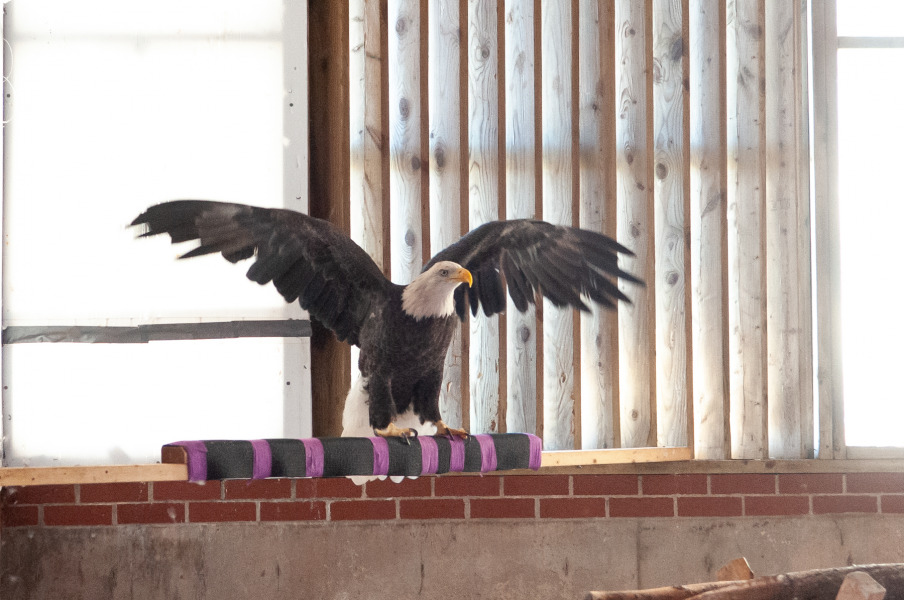Atlantic Veterinary College's bald eagle 450 has found a new home in Nova Scotia

For many at the Atlantic Veterinary College (AVC) at the University of Prince Edward Island (UPEI), it is bittersweet news that bald eagle 450 (450) is ready to be transferred to his new home at Hope for Wildlife.
“The goal of wildlife rehabilitation is to always release back to the wild,” says Dr. Lara Cusack, assistant professor of the Zoo, Exotic, and Wildlife Service (ZEW) in the Department of Companion Animals at AVC. “Unfortunately, with 450, the extent of his injuries did not make him a candidate for a healthy and safe release, so we are fortunate to have a strong partnership with Hope for Wildlife to meet 450’s needs moving forward.”
In late October 2021, 450 was brought into the AVC Wildlife Service. After initial examination by Fiep de Bie, wildlife technician, it was determined that the eagle had extensive head trauma and minor abrasions on his legs. After allowing him time to stabilize from his head trauma, it was also noted that he was unable to stand.
“Although we may never know the root of his injuries, it is presumed that he was hit by a motor vehicle,” says de Bie. “Radiographs (x-rays) showed a possible spinal injury affecting his ability to stand, but due to the unique anatomy of the avian / bird skeleton, it can be much more challenging to assess spinal injuries through x-rays so further testing needed to be done.”
Seeing no improvement in his ability to stand, the team performed a CT scan which confirmed a spinal fracture with spinal cord compression. After consultation and collaboration with various services and teams at AVC, including radiology, anesthesiology, and surgery, it was decided to perform a spinal surgery that would be the second of its kind in the world.
“Although 450’s injuries were significant, we still felt he had the possibility of rehabilitation and a safe release,” explains de Bie. “This surgery, though rare, would give him the best chance to do so.”
After considerable preparation, the surgery was performed and was deemed a success. Within one week, the eagle was able to stand on its own but there was still a long recovery road ahead due to its weakened condition.
“Post-operative care of wildlife species presents unique challenges compared to domestic animals because they can develop secondary injuries from not being in their normal environment,” explains Dr. Cusack. “Because the eagle was still weak, it developed injuries to his wrists from propping himself up with his wings. He also developed pododermatitis, or bumble foot, which is an infection inside the foot from not being able to perch.”
With time, 450 began to heal and hope remained that he would recover to a point that he could be released to the wild. He graduated from a small indoor enclosure to a larger indoor enclosure, and then in April, he was finally ready to be moved to AVC’s outdoor flight cage. It was there that he eventually perched for the first time since being taken to AVC. This was an important milestone because perching meant 450 was able to take pressure off his wings, which subsequently allowed his post-operative wing injuries to heal. He was soon able to fly short distances in the flight cage.
“This was an exciting step for our team but we knew that the wing injuries he sustained were significant so we had to do further assessments to determine what would be healthiest and safest for the eagle,” says de Bie.
It was soon determined that his wing injuries caused a permanent flight impediment and, as a result, he would never be able to fly long distances. This meant that 450 would not be a viable candidate for release. While permanent placement of wild animals in captivity is not always successful, 450 is very tolerant of people due to his long-term care, and his ability to feed himself and care for his feathers. The next question was, where could he live.
“Our mandate is to treat and/or rehabilitate sick or injured wild animals with the intent to release,” explains Dr. Cusack. “Once we determined 450 was not a viable candidate for release, we knew that we’d have to find a new home because we simply do not have the facilities or resources for long-term care.”
So, they turned to Hope Swinimer at Hope for Wildlife in Seaforth, Nova Scotia. Hope for Wildlife is a centre that rescues, rehabilitates, and releases wild animals in Atlantic Canada. They also educate the public about the importance of conserving wild animals and ecosystems, and provide research and knowledge about conservation and wildlife management.
Through a partnership with AVC, UPEI, and Hope for Wildlife, and with generous support from donors, a new enclosure is being built at the facility specifically for 450. It is anticipated that the enclosure will be completed by the end of the year and then the eagle will be transferred to his new home.
“Although it’s our goal, not all of our wildlife cases result in a release back to the wild,” says de Bie. “But we are grateful that 450 now has a permanent home that will allow him to have a very good quality of life.”
The University of Prince Edward Island has selected the Atlantic Veterinary College’s Wildlife Service as the 2022 recipient of donations for Giving Tuesday. Giving Tuesday is the world’s largest generosity movement that inspires people to give, collaborate, and celebrate generosity and takes place on Tuesday, November 29.
Giving Tuesday donations will continue to help AVC’s Wildlife Service to treat injured and sick wildlife like bald eagle 450. This year, a very generous donor has offered to match any donations up to $10,000. To learn more or to donate please visit https://www.upei.ca/friends/giving-tuesday or call 902.894.2888.